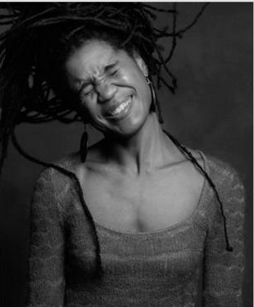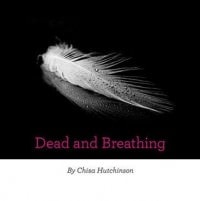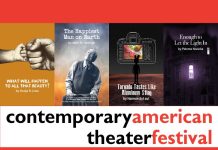This Special Edition of The Playwright’s Playground continues The Playmaker Series: CATF 2014. In a series of in depth conversations, I speak with the artistic teams associated with the plays at this year’s Contemporary American Theater Festival. Playwrights and the Directors share revealing behind the scene insights about their inspirations and the development of their new plays. It’s always refreshing and reaffirming to speak with artists who are not only passionate about the work they do, but are open about sharing their creative process and motivations.
The World Premiere of Chisa Hutchinson’s new play Dead & Breathing debuted this month at The Contemporary Theatre Festival in Shepherdstown, West Virginia. The Festival ends on Aug 3, and this weekend is the final opportunity to see this play and the four other 2014 CATF productions.

The fierce and fun-loving playwright is one of the newest members of the New Dramatists.
Hutchinson has a B.A. in Dramatic Arts from Vassar College and an M.F.A. in Playwriting from NYU – Tisch School of the Arts. Since then she has been honored as a Dramatists Guild Fellow, A Lark Fellow, a Resident at the William Inge Center for Arts, a NeoFuturist and worked as a staff writer for the Blue Man Group.
Her plays include: Dirt Rich, She Like Girls, This Is Not the Play, Sex on Sunday, Tunde’s Trumpet, The Subject, Mama’s Gonna Buy You, Somebody’s Daughter, Alondra Was Here and Dead & Breathing.
Chisa Hutchinson has won a GLAAD Award, the John Golden Award for Excellence in Playwriting, a Lily Award, a New York Innovative Theatre Award, the Paul Green Award, a Helen Merrill Award and has been a finalist for the highly coveted PoNY Fellowship. A recent foray into screenwriting won her Best Narrative Short at the Sonoma International Film Festival.
This content of this interview is based on two conversations with Chisa Hutchinson. The first taking place minutes after Chisa seeing the Opening Weekend production of her play Dead & Breathing for the first time at the Contemporary American Theatre Festival.
Sydney-Chanele: What thoughts are racing through your mind after seeing the CATF production of your new play, Dead & Breathing for the first time?
Chisa: AYYYY!! Thank You!! I couldn’t even eat today because I was so nervous and I’m thinking back to when my agent called and said ‘The Contemporary American Theatre Festival wants to produce Dead & Breathing.’ I was like cool, where’s that? When I was told, I was like ‘they want to do this play?’ Kinda Crazy. So I was very, very nervous coming in. You never know how a new play is going to land, but particularly when one deals with this type of subject matter.
Ed (Herendeen, CATF Founder & Producing Director) and Peggy (McKowen, CATF Associate Producing Director) and James (McNeel, CATF Managing Director) – it’s crazy how good, and dedicated and passionate, driven and magical they are. They just make things happen!
I absolutely agree. When did you write this play and how many drafts went into what we see on stage today?
I wrote this play last year, and this is the fastest a play of mine has ever been picked up. I finished this particular draft. Three months later I got a phone call saying CATF wanted to do it. The lesson learned is two-handers get picked up a lot faster. Other plays (with more characters) have taken three years to be picked up, this one it was less than three months.
There were just two drafts. I wrote it in installments, workshopping it at The Lark. What happens there when you are a Lark Fellow is every other Monday you bring in15-20 pages. They have actors there, they cast it for you and the actors read what you have out loud from a cold reading and you discuss it afterward if you want to. People offer feedback and impressions, and questions. It was a pretty smooth process. The Lark is in it while you are writing it. So, it’s not like you write a draft and then they read it whole. As you’re writing it you get all of this feedback that helps you streamline, and helps you see more clearly your own narrative and the story you are trying to tell.
Very cool. Just two drafts though. Wow. Did you make any tweaks since once the cast started rehearsal? How long in total did it take you to write Dead & Breathing?
No. It was pretty set. I might do a little but of tweaking once this production is over but nothing really major. How long? I don’t know because when I ended up workshopping three plays during my Fellowship year. So maybe it was five or six months because I focused on this play for a good chunk.
Did Ed Herendeen and the CATF find this play through your agent or was it some other means? How was the play discovered?
Ed remembered me. He comes to see the new class get inducted into the New Dramatists every year, and he was introduced to my stuff through a reading as part of the New Dramatists welcoming events. There is a presentation of short scenes from works by their new class members and I had a scene from a play called The Subject. That play is about a Documentarian who has built his success on the death of a kid he’s been filming.
I’m not sure if he contacted my agent or if my agent sent Ed the script, and he remembered my name . . .
Dead & Breathing is so smartly written and well defined. What I loved is how you brought Christianity and spirituality into a play without being heavy handed. This is a comedy. Why was that choice important to you in creating a comedy with those influences, and still keeping it very real?
This play came from a lot of different places. The comedy really came out of me wanting to write about Hospice care. I guess the big trigger was the death of my mom dying from uterine cancer a couple of years ago. In her last days, I took off work and helped take care of her because my aunt down south had been taking care of her and she didn’t really have any help.
I didn’t take care of her very long – I didn’t know at the time – but while I was there we were looking into Hospice care facilities for her because matters were getting worse. We were going to place her, but she said, “uh-uh, Nope. I’m, dying at home, thank you.” And she did.
Anyway . . . So I knew I wanted to write about that experience and how taxing it was, even for a few days, be changing your mom’s diapers and cleaning up vomit, sponge baths . . . There’s just a lot of stuff you never think you’re going to have to do for your mom. It’s hard. Just craziness. To think that there are people out there that devote their lives to this. Wow. It just made me really respect them and wonder about them too. I’m thinking, who chooses to do this?
That was sort of the first domino falling . . .
I thought about the healthcare workers that I know and they are some of the funniest people I know. They all have really wicked senses of humor and they don’t take anything too seriously.
I was sort of drawn to that as a way into the play, because I thought if you’re going to ask people to sit and grin and bare it for two hours or 90 minutes you should make it as funny as possible. I tried to use the humor I’ve observed in these healthcare workers who deal with some of the darkest stuff. Their ability to bring a sense of lightness to it makes for good theater. So that was my way in.
Then I thought I need a nurse – and immediately my Aunt Roni (Aunt Veronika) springs to mind. The funniest one I know. She’s a Hospice Nurse and she’s a pretty inspiring person. The character Veronika in the play is very much based on her. Basically I’ve taken my Aunt, and plopped her into this world that I made up. But she’s had parallel experiences and has seen a lot of shit. She’s been a nurse for a very long time.
Your plays usually involved more than five characters. Did you write this with the intention of it being a two-hander?
I didn’t know this was going to be a two-hander when I started writing Dead & Breathing. Once I got into I thought ‘Oh, you know, I think I can actually get away with this with these two characters.’ I think instinctively I made the second character kind of the opposite of Veronika. We got the light. We got the dark. I was just trying to understand those kinds of people, because I am not so admiring of glass-half-empty people, those I have everything and I’m still not satisfied folks. So I wanted to pit those two against each other and see what happened.
So is the Carolyn character based on anyone you know? What inspired that character?
No. Really I was just thinking who is eventually going to get under the skin of someone like Veronika? Who do I want to watch her with? If there’s a match for her, who does that look like – and it looks like Carolyn. Carolyn is grumpy, ungrateful, and also a little scheming. I wanted to see what would happen if you put those two in a room together.
Have you always wanted to write about your Aunt Veronika?
Well she’s definitely a character! I find her endlessly fascinating. I really do. But it’s not like I was actively looking for something to put her in. It just seemed natural.
Is she going to be able to see the play? How has this changed your relationship?
Yes! She’s coming for closing weekend. She knows I love her to death. And I, of course, of course, sent her the script to get her approval beforehand – and she loved it. I was like ‘Good. I’m in the clear. I can send it out now.’ But, I was not sending it out until I got her approval.
In talking about themes and influences, has Christianity or religion been represented in your work before?
No, not really. In fact because of my mom’s death, suddenly there were family members of mine who got real spiritual – real fast. Or, they’re posting Bible quotations online. I was like, ah – this is interesting. Ok. Ok. And rather than being dismissive, doing the eye-roll thing and getting on the high horse, I tried to go ‘maybe I’ll just try to understand where people are coming from and try to understand the benefit of whatever they’re holding on to.’
I just wanted to see something that presented Christianity that wasn’t heavy-handed and that doesn’t poke fun at it, because I feel Christianity has become the butt of a lot of jokes.
Let’s talk more about you for a moment. Your writing ability is a special talent and this Playwriting gig is a pretty great one when you have days like World Premiere’s of your play. But does this artistic endeavor pay the bills?
I don’t know if Playwriting plays anyone’s bills. Even the super successful playwrights that I know have to supplement with another gig. I’m talking Pulitzer Playwrights. I stopped applying for jobs teaching Playwriting because seriously I know that the people who have won Pulitizers and Tony Awards, and who have their plays turned into successful films, that they’re the ones applying for these jobs. I’m like, ‘how can I compete with that?’
Do you think that’s why there’s this growing trend of artists and playwrights getting their M.F.A.’s to secure jobs at colleges and institutions while they write?
Well that was part of my plan certainly when I got my M.F.A. I was like ‘I have teaching experience – I was an English teacher in my former life – and when I have my MFA, I’ll get a job at the College level which will be great.’ Those positions are like the Holy Grail. I can’t get one at NYU because Annie Baker has it and she’s won a Pulitzer. I am a copywriter for a retail company that I describe as the geriatric cousin of Walmart. There’s a lot on polyester pants and elastic waistbands. I will have worked there a year, a year next month.
I hear the reality, but I have to say that news is discouraging. What keeps you motivated? How do you maintain your drive to write plays?
Every now and then I get a production and it’s always a magical, euphoric experience. You know it’s hard to come down off that high. Sometimes knowing and feeling in your bones there is another one around the corner is enough I think to keep me from gouging my eyes out.
Do you have a particular writing process?
Not really. I usually just sit up in bed and write. Ohh! I’ll tell you this about my process and I had to actually arrive at this conclusion and be O.K. with it. I’m really not the type of chick who can write every day. I know there are writers – and they are very vocal “you have to write every day.” And I was feeling badly about that. But then I realized, I’ve been at this now for maybe nine years and I’ve written eleven plays and they are getting produced – maybe not as often as I would like but they are getting produced and do relatively well. And, I’m actually O.K. with it. My productivity is not the issue here.
So, I write in bursts. I go out and live life and I don’t even think about writing really for months. You go out, see other plays, hang out with friends, get drunk, and make some mistakes and then you get inspired. You come home and read an article in the Times about something that pisses you off and you write a play. That’s how it works for me.
I have gone on a retreat for a week and written entire drafts of plays. I can do that when I have the space and time to focus on that and I don’t have to worry about going to work, and making dinner for the man, and all that other stuff. I just wanted to share that in case it’s helpful to anyone else who’s feeling guilty about not writing every day. I know there are others out there, and we are not vocal enough. There’s more than one way. People need to know that.
I like strong opinions. That being said, what are your thoughts on the disproportionate number of female playwrights consistently being programmed by theater companies?
We’re the majority dammit. We’re 51 percent of the population now, and I certainly don’t know more male playwrights than I know female playwrights, but more male playwrights are being produced. It doesn’t add up. I just want to see it get fixed. What’s going on?
There are groups out there like The Kilroys with The Kilroys List. I think that’s a great idea, and I’m not just saying that because I had three plays on there – not in the top 46 but on the full list. I hope they keep that up every year because that’s a lot of plays, and a great resource for theater companies to broaden their base. Go down the list and produce a couple!
Dead & Breathing is a Festival hit. But one of main criticism being commented on is the ending. Please speak to your reasoning about your choice for the ending – an ending I connected with.
You know that ending is like cilantro. Either you love it or. . . . it either biologically agrees with you or it really doesn’t. There is no in between. I really don’t mind that there are some people out there who are like ‘ugh, come on!’
What is so funny is that every other play that I have written – and I’ve written about 10 others – tends to have a downbeat ending. I don’t like to sugar-coat things. I’m not necessarily a believer in miracles but I desperately wanted one for this play. I say fu#@ it, I’m going for what I’m feeling right now – what I need. That ending is what I need.
Now, I’m not totally dismissive of the response and I am tempted to write an alternate ending. Not as a final thing but as an option for theaters in case this one wants “the upbeat” version and the next one wants “the realistic” version. I’m tempted to give that a go. I wrote what I needed to write for Dead & Breathing.
Chisa that’s major news. The fact that you’re willing to write and offer an alternative ending for Dead & Breathing for theater companies to choose is quite a next step.
With an alternative version, you know some people would consider that to be the miracle. And, I think that’s O.K. I think it’s ok to believe that. Good humans would do that for another human; that is about as close to a miracle as we can get. I think there’s some validity to that. Yeah, I’m totally willing. Why not? I mean for this play; I would not compromise my others.
It sounds like your saying you can see the value in both sides.
Yes. When I started out writing this specific play I didn’t know where it was going. I didn’t know where I wanted to take the ending until it went there, and then I said O.K. I guess that’s just what I needed. That’s what I was feeling and that’s fine too.
Did CATF know about the alternative ending, or has that come about since?
No, they don’t know yet. I haven’t written it, just toying with the idea. Ed actually said one of the things that he liked about the play was the ending. He said, “Thanks for giving me an upbeat ending.” No one has ever thanked me for that before because I just don’t do it.
If it turned out that this was the only production, you really couldn’t ask for a better combination of collaborators, vision, dedication, and professionalism. It’s just a great production with great people.
This production of Dead & Breathing was breathtaking. The acting was exceptional. What surprised you about what you saw on stage?
It always surprises me whenever I see something come out of my head – whenever there’s a version of it that’s on the stage. I’m always surprise of that extra dimension. Ahh! It’s just so exciting – the faces the actors (Lizan Mitchell, N.L.Graham) make, the gestures, the grunting – just the energy that they bring with the inflections and their voice. I could not be happier. They have a great chemistry and play so well off of each other, and are so generous with the audience and each other. They don’t play at the characters. They sit in them. It’s beautiful to watch. Even in all my imaginings I couldn’t have imagined how real and delicious that was going to be.
If the role of the artist is to tell the truth, what does Dead & Breathing reveal?
The truth is there needs to be room for miracles – whatever that miracle looks like for you. There’s more than one way to look at life. Life is not a gift for everyone. You never know where people are coming from.
LINKS:
The Playwright’s Playground: The Playmakers CATF 2014: Playwright Chisa Hutchinson talks about parallels of real life and her play ‘Dead & Breathing’
The Playwright’s Playground: The Playmakers CATF 2014: Director Lucie Tiberghien Discusses Process, New Plays, and the Complex, Textured Clarity of ‘The Ashes Under Gait City’
The Playwright’s Playground: The Playmakers CATF 2014: An Interview with Playwright Christina Anderson(The Ashes Under Gait City)
The Playwright’s Playground: The Playmakers CATF 2014: Ed Herendeen & Peggy McKowen Discuss the Development of CATF Plays
The Playwright’s Playground: The Playmakers CATF 2014: Interview With Ed Herendeen & Peggy McKowen Who Preview The Season
Chisa Hutchinson’s – Website.
The Playwright’s Playground is a monthly in-depth conversation with local female playwright in the D.C. theatre community. Female theatre artists make up more than 50 percent of those involved in the theatre, yet the number of female playwrights being produced is dramatically lower. In this continuing Column, I will also interview and introduce DCMTA readers to the many talented playwrights in the DMV area to learn about their writing process, their inspirations, and their motivations and struggles to write and produce their art. Sydney-Chanele Dawkins.





